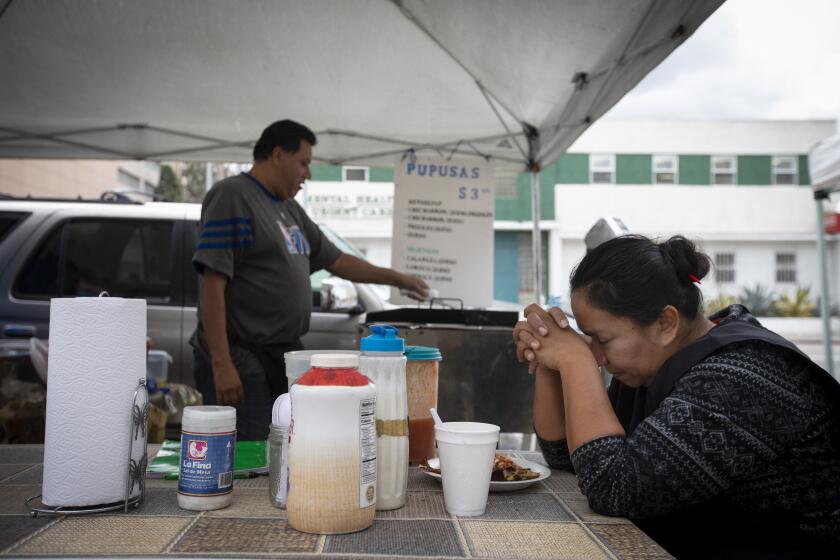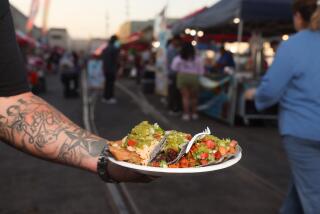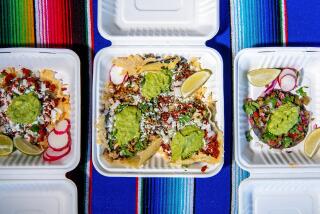L.A.’s beloved taco trucks are in survival mode

On the evening of March 19, shortly after Mayor Eric Garcetti announced that Los Angeles would be placed under a “Safer at Home” ordinance in response to the coronavirus outbreak, the rolling avenues of Boyle Heights were unusually quiet.
At Primos Tacos on Breed Street, normally a crowded lonchera selling tacos, burritos and the chile-sauce-dipped sandwiches called pambazos, only one customer stood in line.
For the record:
11:20 a.m. March 26, 2020A previous version of this story gave the incorrect name for Danny Rodriguez. Also, Merced Villegas’ name is not rendered as Mercede but Merced.
“Service has been down about 20% this week,” said Mario Sedano Torres, whose uncle owns the truck. “People are afraid to come out. I’ve never seen anything like it.”
The scene was equally grim on nearby Soto Street, where the Tacos El Pecas food truck perches nightly at the edge of a spacious, well-lighted car wash. Normally the wait for its dollar al pastor and suadero tacos is formidable, but on this night only one family milled around the truck.
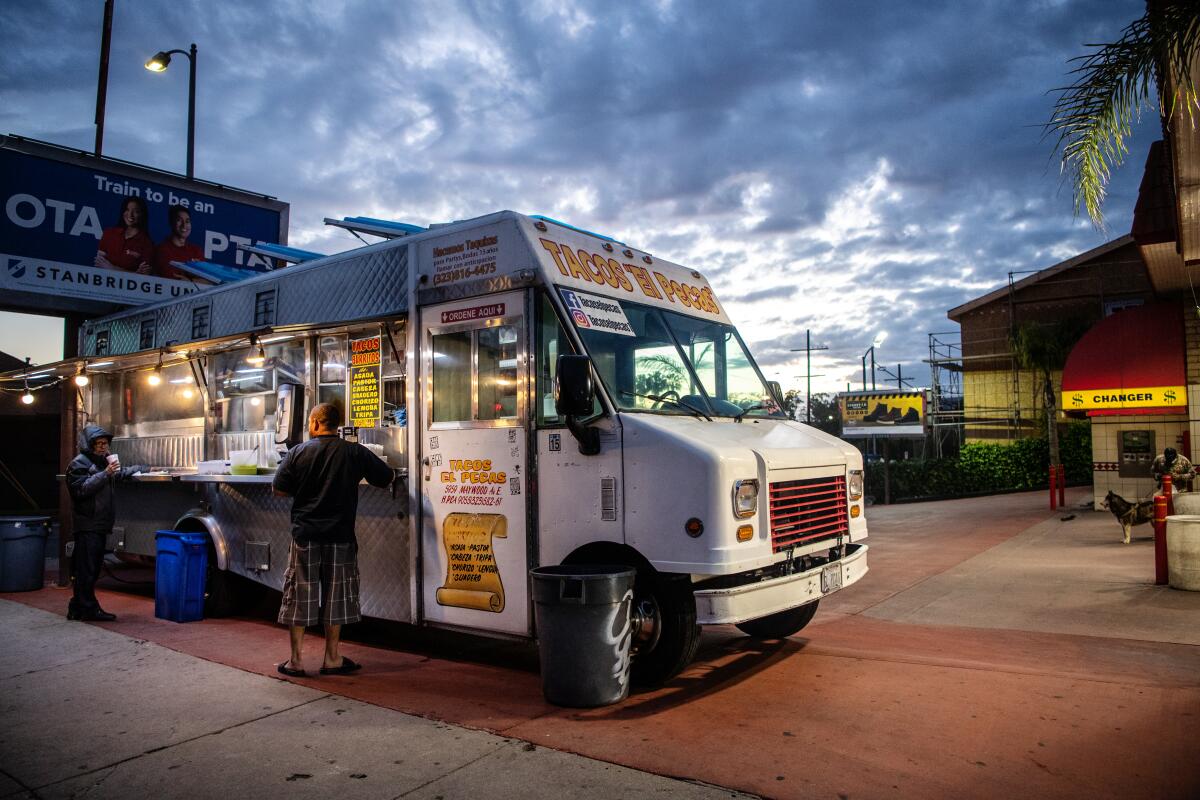
Just four nights before, Garcetti had ordered dine-in service suspended at Los Angeles restaurants to curtail the spread of the novel coronavirus. The directive effectively shut down thousands of sit-down restaurants.
It seemed the mandate, which did not apply to takeout or delivery orders, might not have such a brutally direct effect on taco trucks’ business. (On March 17, citing concerns over the coronavirus outbreak, the L.A. City Council voted unanimously Tuesday to crack down on food vendors without health permits, though food trucks are permitted by the city and allowed to remain open.)
But not even taco trucks, an emblematic feature of the L.A. culinary landscape, are being spared the economic fallout of the global pandemic.
With drastic reductions in foot traffic and revenue, many of the city’s popular taco vendors are fighting for their livelihoods.
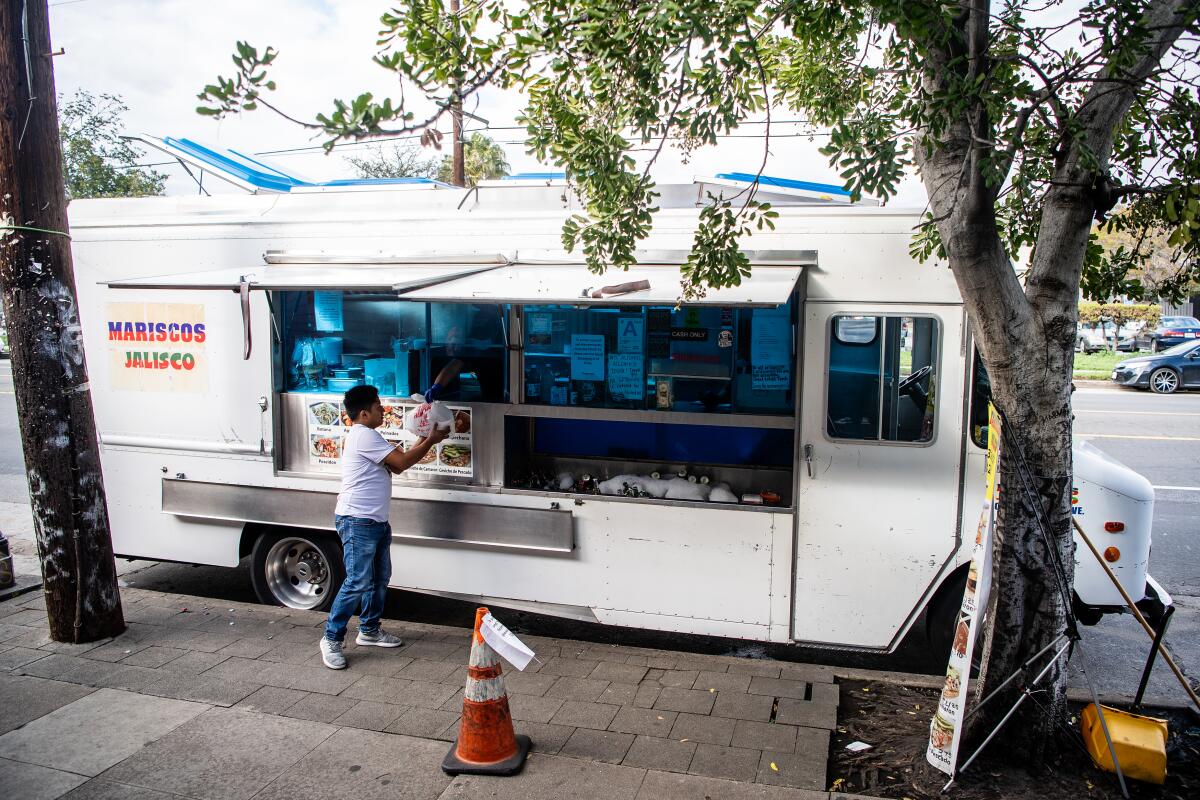
Raul Ortega, who operates Boyle Heights’ Mariscos Jalisco food truck with several family members, says that in 19 years of business he’s never witnessed such a steep decline in revenue.
“We went through something like this in the 2008 recession,” he said. “But the way I see it, this time this is worse. People are very scared. It’s very uncertain what’s going to happen next week or next month.
“We’re in survival mode,” he said.
He’s counting on customer loyalty; the restaurant’s tacos dorados de camaron and chile-blistered seafood tostadas are widely considered essential eating for locals and visitors.
“We have a unique product and customers that support us,” he said.
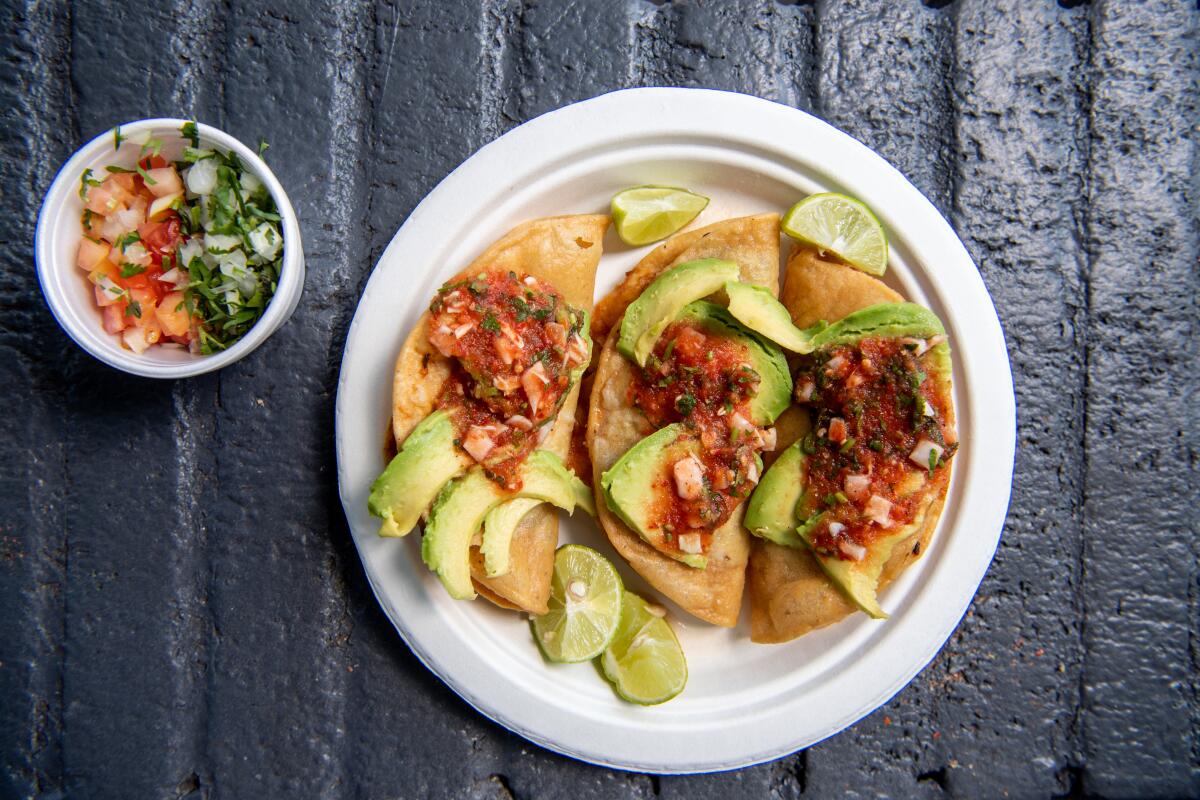
On the night that the “Safer at Home” mandate was announced, Ortega held a staff meeting with his tightknit team of 10 employees, most of whom have been with the truck for more than a decade.
“I basically told them: ‘Bear with me. If you want to stick with me, we’re going to have to cut everybody’s income in half just to have enough to pay the rent and eat,’” he said.
Everyone on his staff has agreed to try to muddle through the crisis together, he said. As long as his truck is on the street every day, Ortega believes he can make just enough money to survive.
“I’m worried about all these people. All these people have families and kids to feed,” he said.
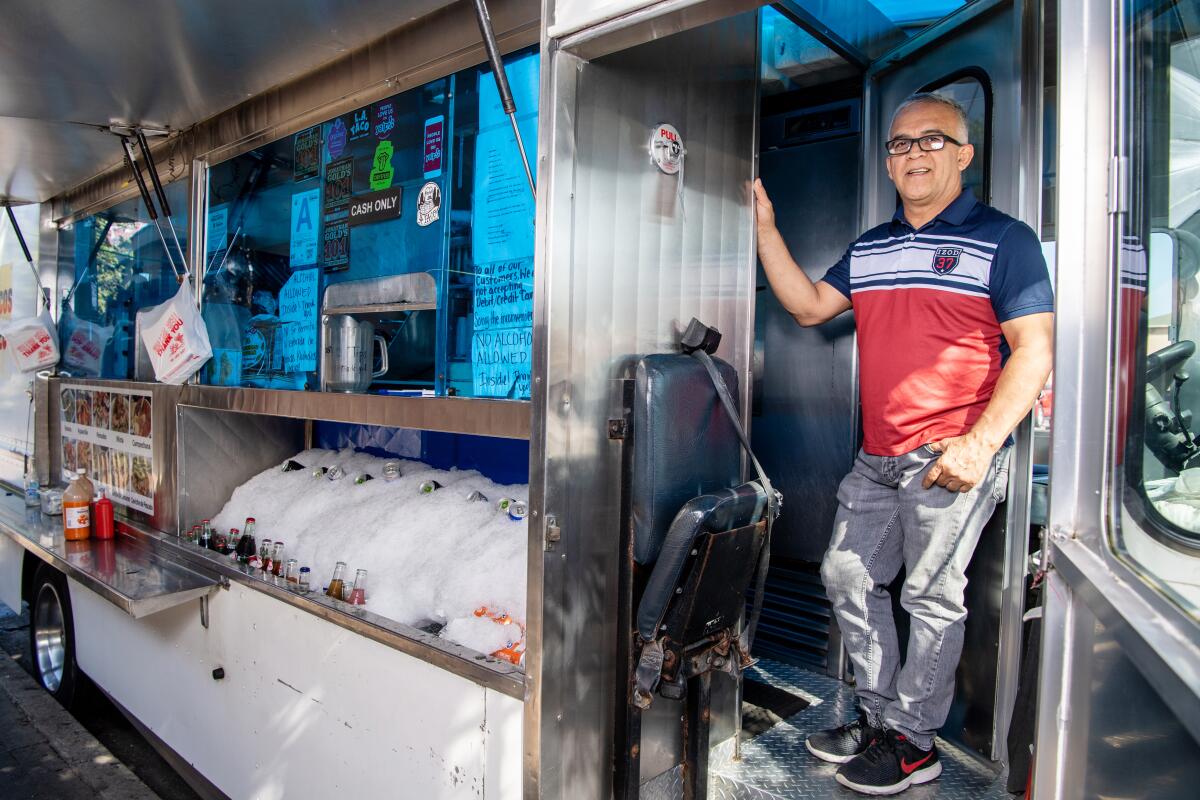
Not far from where Mariscos Jalisco parks on Olympic Boulevard, Los Originales Tacos Árabes de Puebla sells cemita sandwiches, quesadillas and taco árabes — cheesy, chile-sluiced pork swaddled in powder-soft flatbread.
Business has dropped by 20%, said Merced Villegas, who operates the truck with various family members.
“Usually we make two 90-pound trompos,” she said.
“But business has been so slow that we’re only making one 90-pound trompo now.”
The Villegases have removed the tables and chairs that normally provide seating for customers, a move to comply with government mandates to reduce gatherings of 10 people or more.
The family is considering reducing the truck’s hours of operation to only weekends, when it’s more likely to get customers.
City leaders voted to crack down on food vendors in Los Angeles who lack health permits amid coronavirus pandemic.
Villegas has many fears about the coming weeks. She’s afraid the meat supply to her business will be reduced soon. And she worries about her family working outside the home during a time when government officials and public health experts are advising people to remain indoors.
“I’m worried one of us will get sick. We have a small child in the family,” she said.
The financial fallout is an even bigger threat to street vendors, who often sell food side by side with taco trucks — and often don’t have permitting.
I’m worried about all these people. All these people have families and kids to feed.
— Raul Ortega, owner of Mariscos Jalisco
Rosario Rios, who runs a popular stand selling tacos al vapor in Boyle Heights, says she plans to sell one more weekend before shutting down indefinitely.
“I already cooked food and I don’t want it to go to waste, so I may go sell this weekend. But next weekend I won’t be out anymore,” she said.
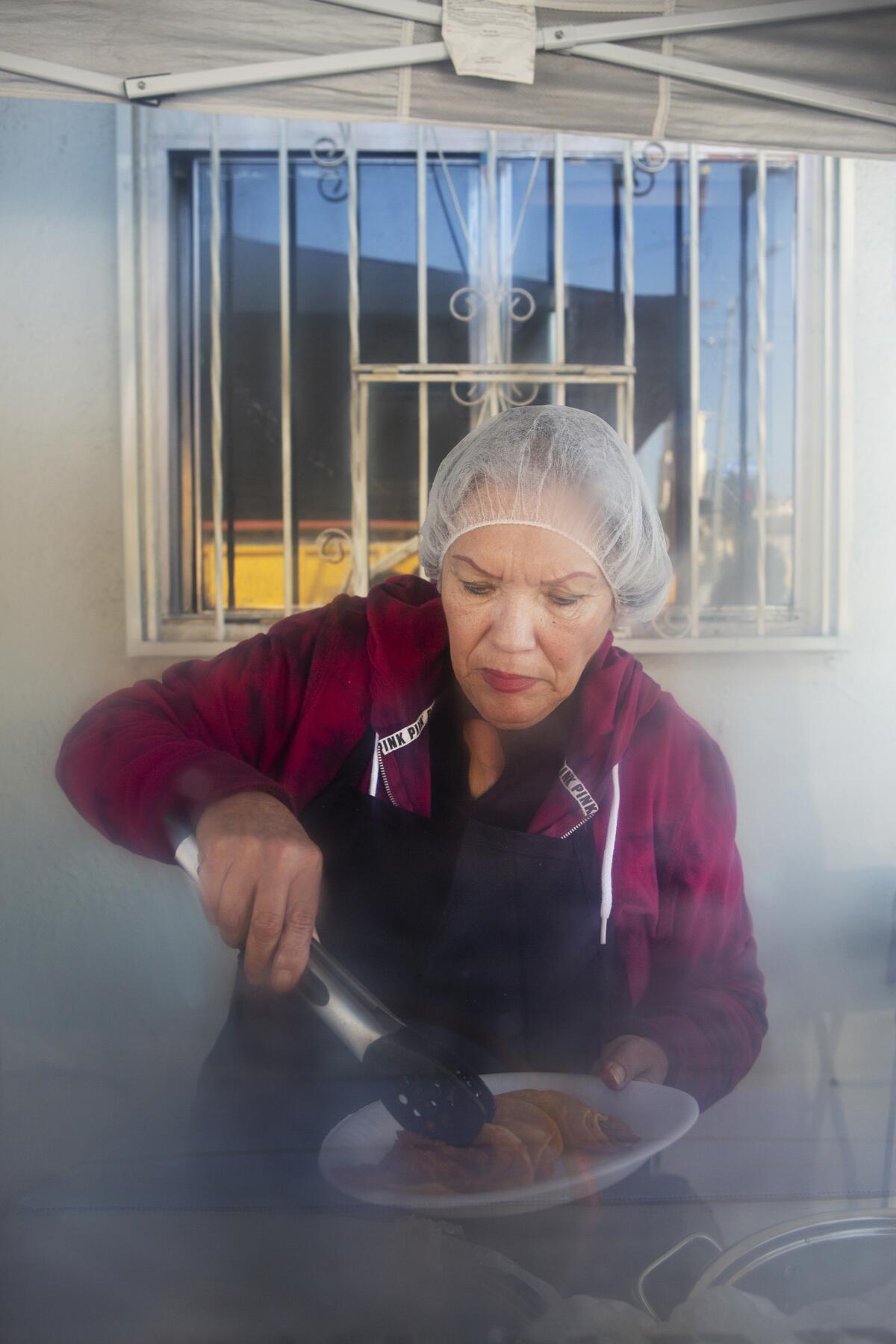
“If the police tell me I have to stop vending, I will stop. I don’t want any trouble.”
One business owner going to great lengths to maneuver the coronavirus crisis is Danny Rodriguez of Pablito’s Tacos, a Mexican-Peruvian taco joint that started as a small taco stand in a Burbank parking lot.
Until recently, Rodriguez and chef Flor Oropeza operated four locations but have consolidated them into two “taco hubs”: a North Hollywood taco truck parked in front of Circus Liquor and their regular bricks-and-mortar location in Burbank.
“We’ve taken a pretty hard dip in sales. We’re talking about 60% to 70%,” Rodriguez said.
To survive, Rodriguez has been forced to lay off staff, reducing his team to eight employees from 25.
He has been brainstorming various promotions and events to stay in business.
Inspired by Mel’s Drive-In, which recently announced that it will be resurrecting its ’50s-era carhop service to attract more customers, the Burbank location is offering its own carhop delivery and free churros.
He also has introduced an entertainment component: On Saturday nights, Pablito’s transmits live concerts from the restaurant featuring Chicano rap star Kid Frost. Customers who tune in via the restaurant’s live Instagram and Facebook feeds can place orders, buy swag and get shout-outs from Frost.
The concerts will be broadcast every Saturday night until the self-quarantine order has been lifted, Rodriguez said.
“It’s getting harder and harder to stay open,” he said. “Right now you have to try everything. You have to turn every rock and see what’s gonna work.”
More to Read
Eat your way across L.A.
Get our weekly Tasting Notes newsletter for reviews, news and more.
You may occasionally receive promotional content from the Los Angeles Times.
